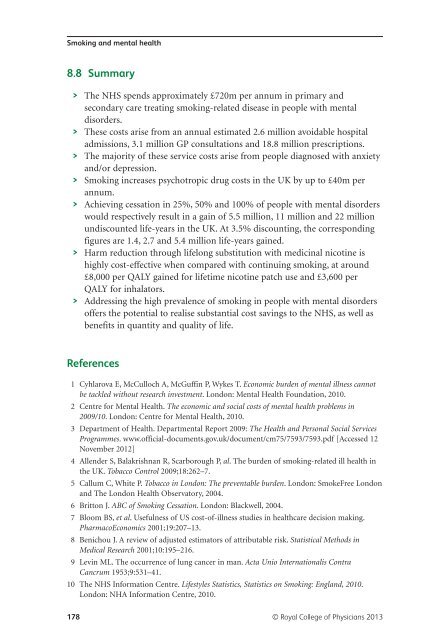Smoking and mental health - NCSCT
Smoking and mental health - NCSCT
Smoking and mental health - NCSCT
You also want an ePaper? Increase the reach of your titles
YUMPU automatically turns print PDFs into web optimized ePapers that Google loves.
<strong>Smoking</strong> <strong>and</strong> <strong>mental</strong> <strong>health</strong><br />
8.8 Summary<br />
> The NHS spends approximately £720m per annum in primary <strong>and</strong><br />
secondary care treating smoking-related disease in people with <strong>mental</strong><br />
disorders.<br />
> These costs arise from an annual estimated 2.6 million avoidable hospital<br />
admissions, 3.1 million GP consultations <strong>and</strong> 18.8 million prescriptions.<br />
> The majority of these service costs arise from people diagnosed with anxiety<br />
<strong>and</strong>/or depression.<br />
> <strong>Smoking</strong> increases psychotropic drug costs in the UK by up to £40m per<br />
annum.<br />
> Achieving cessation in 25%, 50% <strong>and</strong> 100% of people with <strong>mental</strong> disorders<br />
would respectively result in a gain of 5.5 million, 11 million <strong>and</strong> 22 million<br />
undiscounted life-years in the UK. At 3.5% discounting, the corresponding<br />
figures are 1.4, 2.7 <strong>and</strong> 5.4 million life-years gained.<br />
> Harm reduction through lifelong substitution with medicinal nicotine is<br />
highly cost-effective when compared with continuing smoking, at around<br />
£8,000 per QALY gained for lifetime nicotine patch use <strong>and</strong> £3,600 per<br />
QALY for inhalators.<br />
> Addressing the high prevalence of smoking in people with <strong>mental</strong> disorders<br />
offers the potential to realise substantial cost savings to the NHS, as well as<br />
benefits in quantity <strong>and</strong> quality of life.<br />
References<br />
1 Cyhlarova E, McCulloch A, McGuffin P, Wykes T. Economic burden of <strong>mental</strong> illness cannot<br />
be tackled without research investment. London: Mental Health Foundation, 2010.<br />
2 Centre for Mental Health. The economic <strong>and</strong> social costs of <strong>mental</strong> <strong>health</strong> problems in<br />
2009/10. London: Centre for Mental Health, 2010.<br />
3 Department of Health. Depart<strong>mental</strong> Report 2009: The Health <strong>and</strong> Personal Social Services<br />
Programmes. www.official-documents.gov.uk/document/cm75/7593/7593.pdf [Accessed 12<br />
November 2012]<br />
4 Allender S, Balakrishnan R, Scarborough P, al. The burden of smoking-related ill <strong>health</strong> in<br />
the UK. Tobacco Control 2009;18:262–7.<br />
5 Callum C, White P. Tobacco in London: The preventable burden. London: SmokeFree London<br />
<strong>and</strong> The London Health Observatory, 2004.<br />
6 Britton J. ABC of <strong>Smoking</strong> Cessation. London: Blackwell, 2004.<br />
7 Bloom BS, et al. Usefulness of US cost-of-illness studies in <strong>health</strong>care decision making.<br />
PharmacoEconomics 2001;19:207–13.<br />
8 Benichou J. A review of adjusted estimators of attributable risk. Statistical Methods in<br />
Medical Research 2001;10:195–216.<br />
9 Levin ML. The occurrence of lung cancer in man. Acta Unio Internationalis Contra<br />
Cancrum 1953;9:531–41.<br />
10 The NHS Information Centre. Lifestyles Statistics, Statistics on <strong>Smoking</strong>: Engl<strong>and</strong>, 2010.<br />
London: NHA Information Centre, 2010.<br />
178 © Royal College of Physicians 2013














